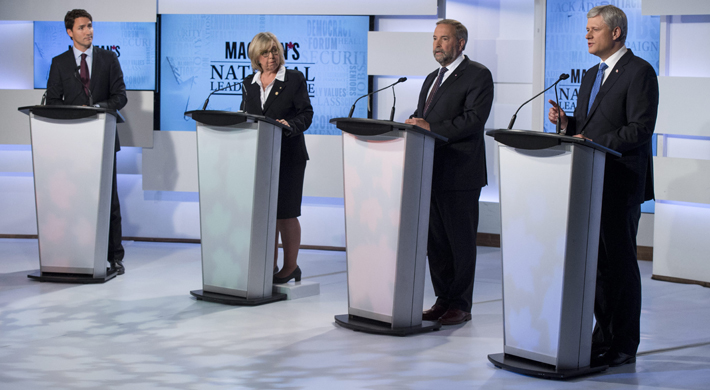
Montreal – A new report by the Institute for Research on Public Policy, and Carleton University’s School of Journalism and Communication and Riddell Graduate Program in Political Management, calls for a new approach to organizing leaders’ debates in federal election campaigns.
Released in the aftermath of controversies surrounding the way the leaders debates were managed during the 2015 general election, the report summarizes the main issues emerging from a colloquium held at Carleton University in December 2015, as well as identifying important questions that should be addressed prior to the next federal election.
As the discussions at the colloquium made clear, the “debate about the debates” in the last election cycle raised some highly sensitive issues, which are still unresolved. What format should the debates take? Which party leaders should participate? And, perhaps most crucially, Who owns the debates? While the majority of participants felt it would be ill-advised to return to the broadcast consortium model that existed prior to the last election, no consensus emerged on the way forward.
In order to launch a much-needed public discussion on the future of leaders’ debates, the report says, decision-makers must first elaborate a public statement about what the debates should be: they must be conceived of as a democratic exercise, not a journalistic endeavour. Put simply, they must belong to citizens, not to political parties or media organizations.
Then, clear rules must be established to determine who is invited to participate in the debates, the grounds on which others might be refused, and the rules of engagement for political parties. These rules must be determined in an open and transparent process, and they must be available and understandable to voters. Moreover, the new model must account for recent technological advancements and the blurring of lines between print, broadcast and online media, as well as the changing news consumption habits of citizens.
While the mandate letter of the Minister of Democratic Institutions refers specifically to the creation of an independent debates commission, it is important to first forge a consensus on basic principles, which can then guide the debate about the most appropriate way to organize future debates, says the report.
The Future of Leaders’ Debates in Canadian Federal Elections can be downloaded from the Institute’s website (irpp.org). Together with this release, Policy Options magazine is highlighting a special feature on this topic (available at policyoptions.irpp.org), with articles by Paul Adams and Elly Alboim, Elizabeth May, Steve Paikin and Vincent Raynauld.
-30-
The Institute for Research on Public Policy is an independent, national, bilingual, not-for-profit organization based in Montreal. To receive updates from the IRPP, please subscribe to our e-mail list.
Media contact: Shirley Cardenas tel. 514-594-6877 scardenas@nullirpp.org

Cléa Desjardins
Communications Director
514-245-2139 • cdesjardins@irpp.org